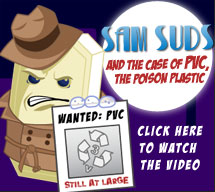PVC gets animated
 As part of their campaign against PVC – polyvinyl chloride – the Center for Health and Environmental Justice has an animated awareness video featuring Sam Suds – a private detective/bar of soap whose mission is to keep toxins out of the Johnson household. The message of the video is loud an clear: PVC is bad, it’s all around you, but it’s easy to spot – just look for the 3 or the V.
As part of their campaign against PVC – polyvinyl chloride – the Center for Health and Environmental Justice has an animated awareness video featuring Sam Suds – a private detective/bar of soap whose mission is to keep toxins out of the Johnson household. The message of the video is loud an clear: PVC is bad, it’s all around you, but it’s easy to spot – just look for the 3 or the V.
The Center for Health and Environmental Justice has called on big box retailers like Wal-Mart and Target to phase out PVC sales within their stores. According to a recent CHEJ press release as a result of their efforts, “Wal-Mart has already begun to phase out PVC in packaging and children’s lunchboxes. Last October, in response to health and environmental concerns, Wal-Mart announced plans to phase out PVC plastic in private label packaging over the next 2 years.”
